Aylin - Diary of a Tatar girl
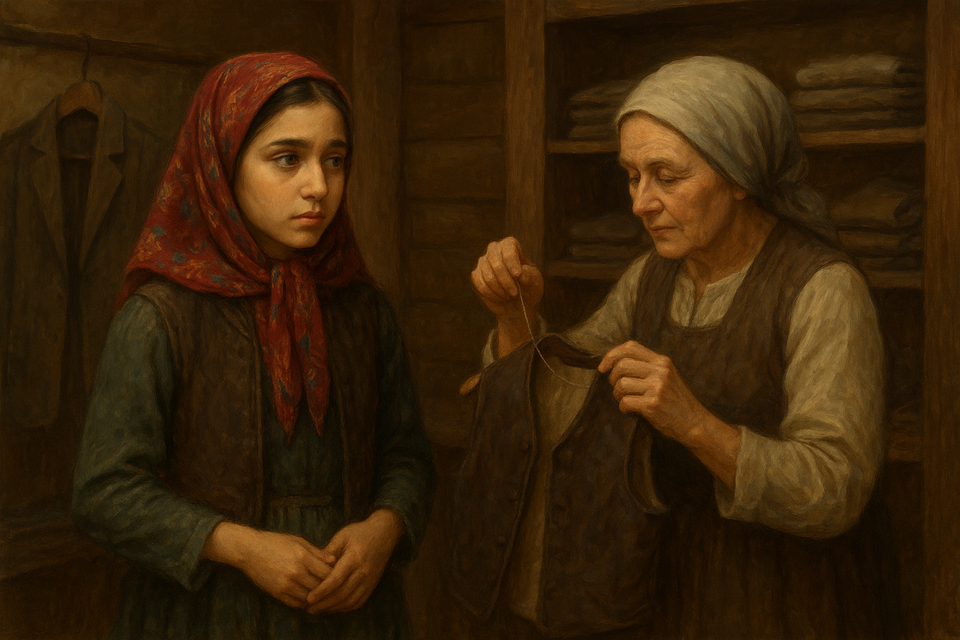
Baseline theme to the story
- Protagonist: A 14-year-old Tatar girl named Aylin (meaning moonlight).
- Setting: Dobrogea, Romania, a multicultural region on the Black Sea, rich with Turkish, Tatar, Greek, Bulgarian, and Romanian influences.
- Main theme: A tailor woman (Doamna Zarif) makes enchanted waistcoats for her favourite people. Each waistcoat takes Aylin somewhere new when she tries it on in the small wooden cabin.
Journal Entry 1 – April, 1935
Dear Journal,
Today, Doamna Zarif gave me my first waistcoat. Dark green, soft but heavy, with silver stitches hidden on the inside, like secret stars sewn into the cloth. She told me to try it on in the little cabin at the back.
When I closed the curtain in the changing booth, the world shifted. At first, I thought I had fainted — the floor felt as if it dropped beneath me. When I opened my eyes, I was standing on wet ground, my toes muddy, my hands calloused and brown. I was no longer Aylin. I was a boy, barefoot, my hair long and tied with a leather string.
Before me stretched a great river, wide as the sky. The reeds whispered in the wind, tall as a man. Birds I had never seen — white with long necks, black with wings like knives — rose from the marshes. Their cries echoed through the air like long horns.
I wasn’t alone. There were others: boys my age, skin sun-browned, wearing rough wool tunics. They called me by a name I had never heard — Drenus. I answered without thinking, as if it had always been mine. My voice sounded different, but familiar to me, like it was mine in a past life. Maybe I was reliving a past life?
For three days, I lived as Drenus. We fished with wicker traps. We set nets at dawn and checked them at night. I felt the slime of fish between my fingers, smelled the firewood smoke, and ate hot bread baked on stones.
But there was something more. On the third day, we heard a drum roll across the water. From the reeds, we saw them: Roman boats, long and heavy, with sails dyed red as blood. Rows of soldiers rowed in silence, just the sound of heavy work, of heaving and effort, a very masculine sound. Their helmets caught the sun like fire. One of the older boys whispered, “The eagles come. They will take our land.”
I felt his fear inside my muscular chest, yet I also felt wonder. These men were strangers, powerful and rugged beings, their ships like beasts of wood and iron. I understood that the world was bigger than our river, bigger than Dobrogea, bigger even than all the lands I had ever known.
That night, an old man of the village told us: “Remember the river. The river remembers you. Empires pass, but the water flows on and maybe in centuries from now, it will return to this spot, always remembering all it saw on the way.” His words stayed with me.
And then — just as suddenly — the cabin curtain swayed, and I was back. My own hands again, my own face. Only half an hour had passed. But I still smelled of smoke, and the soles of my feet tingled with the feeling experienced in muddy grass.
Doamna Zarif looked at me as if she already knew. She only said, “Write it down, child. You must keep it safe.”
So I rushed home and wrote this. And I wonder: am I still Aylin, or am I also Drenus, who once lived by the Danube and watched the red sails of Rome or am I both?
— Aylin, age 14
Journal Entry 2 – June, 1935
Dear Journal,
It took me some weeks before I had the courage to visit the tailor again. At first, I thought I would never return, but over the past few weeks, I have come to terms with the amazing out-of-body experience.
The second waistcoat was brown wool, plain to look at, but with a lining of red thread. I stepped into the cabin, and again the floor tipped.
I woke to the sound of groans. A canvas tent above me flapped in the wind. The air smelled of iron and vinegar. I looked down — I was holding a bowl of water and a rag stiff with blood. I was no longer Aylin. I was a girl of sixteen, thin as a reed, in a camp of war.
Outside, soldiers limped and shouted, the air was thick with the smell of sulphur and smoke. It was 1877, the time when Romanians fought beside Russians against the Ottomans. They called me Katya. I wiped sweat from the faces of men I did not know, poured water over wounds, pressed linen into holes where bullets had torn.
One night, a boy younger than me cried for his mother in Turkish, though he wore no uniform. His eyes were wide with terror. I started to comfort him, but another nurse pulled me back, whispering: “He is the enemy.”
I could not accept it. His blood was the same red as ours. His warm tears tasted of salt as I discovered, no different from mine. So I broke a piece of bread and gave it to him. He ate as if it were life itself. And the look of solent gratitude was carved into my very soul.
I had never experienced the ravage of war before, or had I? I was strangely at ease there, even though it was unfamiliar, as if I had much experience of wartime nursing. The men and boys without limbs, missing an eye, or with burned or scarred flesh, did not shock me. I had a purpose there, friend or foe, I was needed, firstly by my colleagues, but also by the wounded. Soldiers were talking in Serbian, Montenegrin, Russian, Romanian and Bulgarian, as well as Turkish and Tatar.
What struck me most, the thing that angered and puzzled me, is that all this death and destruction seemed to be about the constant reshaping of borders, which in this particular battle was to bring an end to 500 years of Ottoman dominance over the region, leading to independence for many neighbouring lands.
When I returned to the cabin, my hands still shook. Only thirty minutes had passed, but in my memory, I had lived a week. The lesson was carved into me: war divides people who could have been friends, and moreover, would later be friends and allies in future interactions.
— Aylin, age 14
Journal Entry 3 – Sept, 1935
Dear Journal,
On my next visit, the third waistcoat shimmered — blue with thin gold threads. When I put it on, I smelled smoke and candlewax.
I was sitting at a desk, a quill in my hand. I was a boy, a scribe in the city of Tomis, long ago in the time of the Byzantines. My name was Niketas. The letters I wrote were Greek, curling and beautiful. My fingers cramped, but I felt proud.
The city was alive with voices. Merchants shouted by the harbour, sailors unloaded amphorae of oil and wine, and fishermen sang as they pulled their nets. From my window, I could see the Black Sea stretch like polished glass, completely flat and limitless.
In the evenings, I copied holy books by candlelight. My master told me: “Words are ships. They carry souls across centuries and deliver them to eternal paradise.” I understood then that the books I copied might survive longer than stone walls, longer than kings.
When I returned to myself, my hands itched to write more carefully, to keep every word safe. Perhaps this journal is also a ship, carrying me to the future.
— Aylin, age 14
Journal Entry 4 – Dec, 1935
Dear Journal,
The fourth waistcoat was coarse, grey, and heavy as stone. I slipped into the booth and was swallowed by cold air.
When I opened my eyes, I stood in the snow. My breath came out in steam clouds. I was taller, my shoulders broader. A crook rested in my left hand — I was a shepherd boy in the Carpathian mountains. My name was Ionel.
The sheep huddled close, nervously, not at peace, their wool steaming in the frost. Wolves howled from the forest edge. I imagined the wolves watching me, waiting for me to falter. At night, I slept beside the fire, wrapped in a sheepskin cloak, listening to stories and rumours from older men about Michael the Brave, who fought to unite the three Romanian lands.
On the second day, I saw soldiers pass through the valley — ragged, half-starved, carrying pikes and muskets. They marched behind a banner, red and gold. They looked at me with hollow eyes, and I understood: wars were not only fought by kings but endured by peasants, shepherds, and hungry men.
One old soldier stopped and placed his hand on my shoulder. “Guard your flock,” he whispered. “They are your kingdom.”
When I returned, my hands still stung from frostbite. I wrote quickly before the warmth of my room erased the mountain cold from my skin. Lesson learned: not all battles are fought with swords. Some are fought simply by holding on, watching the wolves, keeping the fire alive, staying fit for life's battles, and keeping alert lest I be conquered when not attentive to my surroundings.
— Aylin, age 14
Journal Entry 5 – March, 1936
Dear Journal,
This time, the waistcoat shimmered with threads of copper and green, like sunlight on water. When I blinked, I was standing in a harbour.
I was a girl again — dark hair, long braids, a necklace of blue glass beads. My name was Despina, daughter of a Greek merchant in Constanța during the Ottoman days. The sea smelled of salt and tar, the harbour full of shouts in a dozen languages — Turkish, Greek, Romanian, Armenian.
My father’s shop was filled with spices: cinnamon, pepper, saffron. The scent clung to my clothes. Sailors bargained for cloth, women bought olive oil, and a beggar boy sang for coins.
One evening, I sneaked out and met a friend, a Tatar boy named Emir. We spoke in whispers by the shore, laughing nervously at how our fathers would scold us if they knew. He gave me a shell, pink and spiralled, saying: “The sea keeps some secrets. So must we.”
For a week, I lived in markets and under sails, learning that Dobrogea was never one people, but many. The land carried voices, memories, experiences, pain, joy, loss and suffering like a woven carpet, each thread strong because it was bound to the others.
When I came back, the scent of saffron still lingered on my hands. I hid my writing quickly — as if my parents might smell it on the page.
— Aylin, age 14
Journal Entry 6 – July, 1936
Dear Journal,
The sixth waistcoat was black, with small stitches in white. It felt solemn even before I put it on.
When the curtain closed, I was in a dark cellar with others I could not make out. It smelled of damp earth and fear. I was a Jewish boy, maybe twelve, in Iași during the war. My name was David.
Upstairs, boots stomped. Shouts cracked the air like whips. We held our breath in the dark, clutching one another. I had a prayer book in my lap, though I could not see the letters.
Days passed in near-silence, broken only when a woman brought us scraps of bread. Her hands shook, but her eyes were fierce. “You must live,” she whispered. “You must live for those who cannot.”
I thought I would die there, of hunger or fear. Yet somehow, hope flickered like a candle that refused to die out. I understood then that survival itself can be an act of defiance.
When I returned to myself, I could not eat supper. My throat burned. But I wrote this down because David’s voice cannot be lost.
— Aylin, age 15
Journal Entry 7 – Oct, 1936
Dear Journal,
The seventh waistcoat was rough, stitched from dark wool with a red patch at the heart.
When I stepped into the booth, the smell of pine filled my nose. I was in the mountains in the 1940s. My hands clutched a satchel. I was a girl again — a partisan courier. They called me Ana.
I climbed forest paths, my boots slick with rain. In my satchel were papers: maps, messages, codes. Soldiers hunted us — German patrols, boots and rifles. We moved at night, whispered by streams, and lit no fires.
One evening, a comrade pressed an old and heavy pistol into my hand. “If they catch you,” he said, “burn the papers. Do not let them take what you carry, and defend yourself.”
My heart beat so loudly I feared it would give me away. Yet each step felt stronger than the last. I came to understand that courage was not the absence of fear, but walking ahead anyway. He who has no fear is either mad, a demon, or inhumane.
When I returned, my hands were still trembling. But something new stirred in me — a flame that would not go out.
— Aylin, age 15
Journal Entry 8 – Feb, 1937
Dear Journal,
The eighth waistcoat was leather, stiff and smelling of smoke. When I blinked, I wore armour. I was a Roman soldier, standing at Tropaeum Traiani — Adamclisi, the great stone monument in Dobrogea.
The harsh wind cut across the plains like a knife. We kept watch in silence, the campfires burning low. I marched, drilled, and sharpened my blade. My name was Marcus, though in my heart I was still Aylin.
At night, I gazed at the carved monument rising like a crown against the stars. It was built to remember the victory — the Dacians' fallen. But as I touched the cold stone of the monument, I thought: who remembers their faces? Their mothers? Their songs?
The monument was both a testament to glory and a grave. I learned that every triumph hides another’s sorrow.
When I came back, I wrote quickly, afraid the lesson would slip from me.
— Aylin, age 14
Journal Entry 9 – May, 1937
Dear Journal,
The ninth waistcoat smelled of salt. Its cloth was blue and grey, like the sea.
I opened my eyes to waves crashing on the Black Sea shore. I was a Bulgarian fisherman, Petar, in the 19th century. My hands were strong, knotted by rope. My boat rocked like a cradle and a coffin.
We cast nets at dawn, sang old songs to keep rhythm. Storms came suddenly — the sky blackened, the sea rose to swallow us. One night, lightning struck so close the water turned white, and I thought I would die. But the sea spat us back, as if amused.
Life was harsh, but in the tavern by the port, laughter was loud. We told stories, shared bread and wine, and for a moment, poverty felt light.
When I returned, my fingers still smelled of fish. I realised that hardship binds people together as much as joy does.
— Aylin, age 16
Journal Entry 10 – August, 1937
Dear Journal,
The tenth waistcoat was unlike any before. Silver, soft as moonlight. When I closed the curtain, I gasped.
I was still Aylin — but older. A woman grown, with strong hands, eyes lined by years of toil, struggle, joy, sadness, battles and victories. I stood in a quiet Dobrogea, fields golden, the sky vast and calm. Children laughed in the distance. No soldiers, no fear.
I walked through streets where people of every tongue and dress — Romanians, Tatars, Greeks, Armenians — spoke together as neighbours. My heart filled with something I had no word for. Maybe it was peace. Maybe it was belonging.
I touched the earth and whispered, “So this is what we fight and die for.”
When I returned, I cried. Not from sorrow, but because the future had kissed me. And I knew now that my life, my choices, even my words in this journal, might shape what is to come. I was somehow certain that I had lived many lives, each one more prepared, more refined, wiser and kinder than the previous, and I was sure I would live more lives, until my soul, my spirit, was as pure as driven snow, and my heart could love without judgment.
The waistcoats do not only show me who I was. They show me what I might yet be.
— Aylin, age 16
The story within has been in my head for perhaps 4 years, but finally, I wrote it. I hope you enjoy it as much as I did creating it.

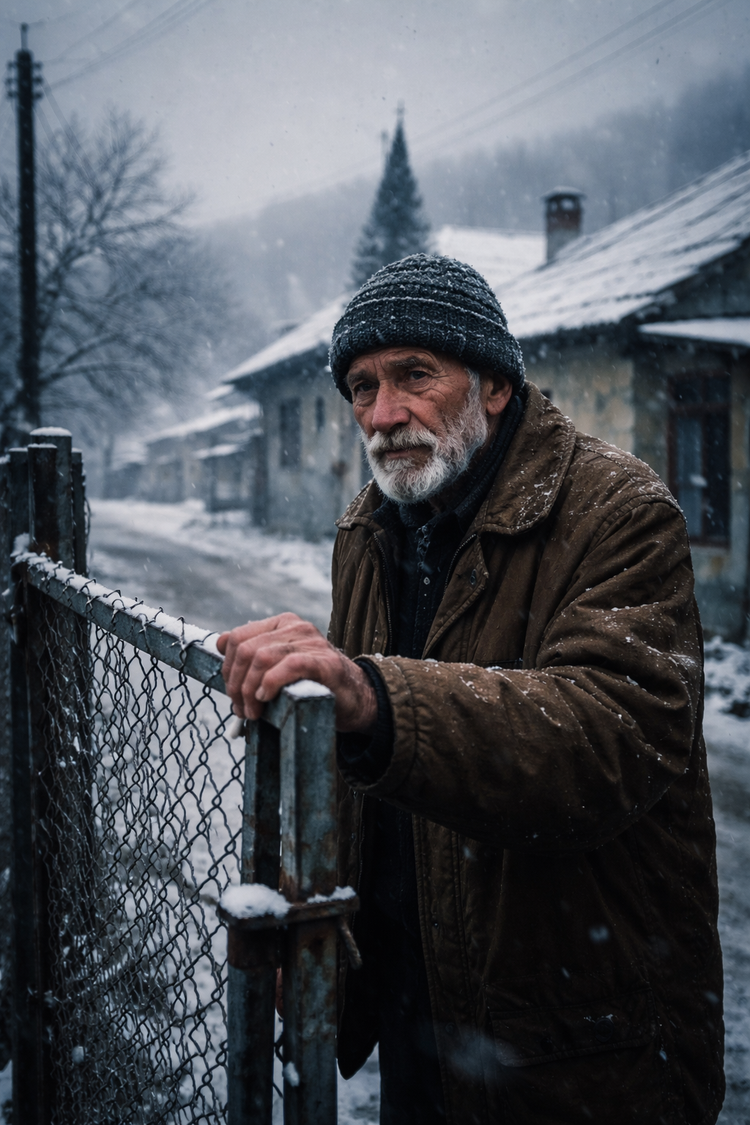
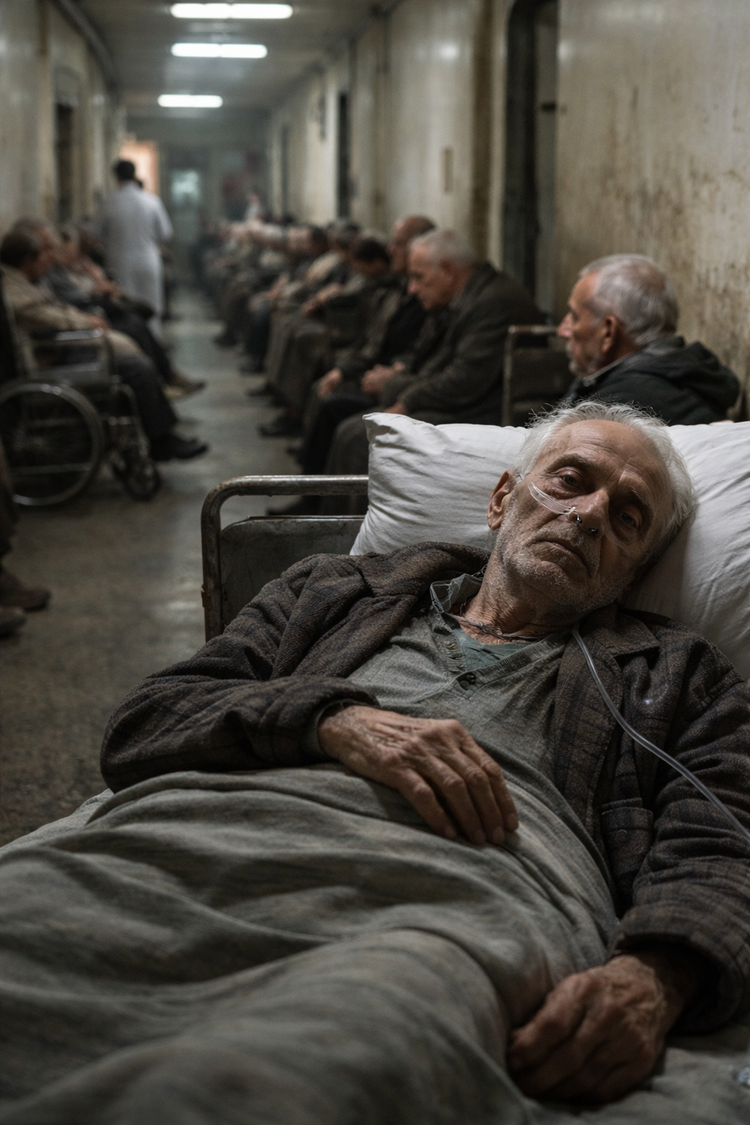
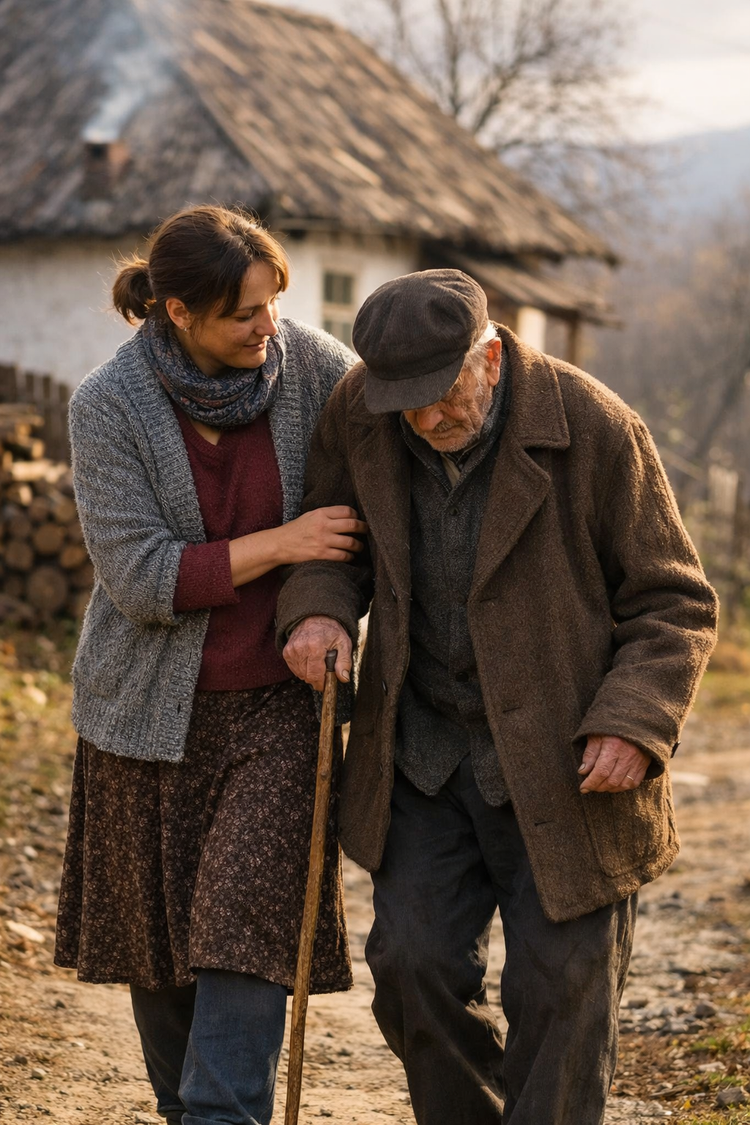
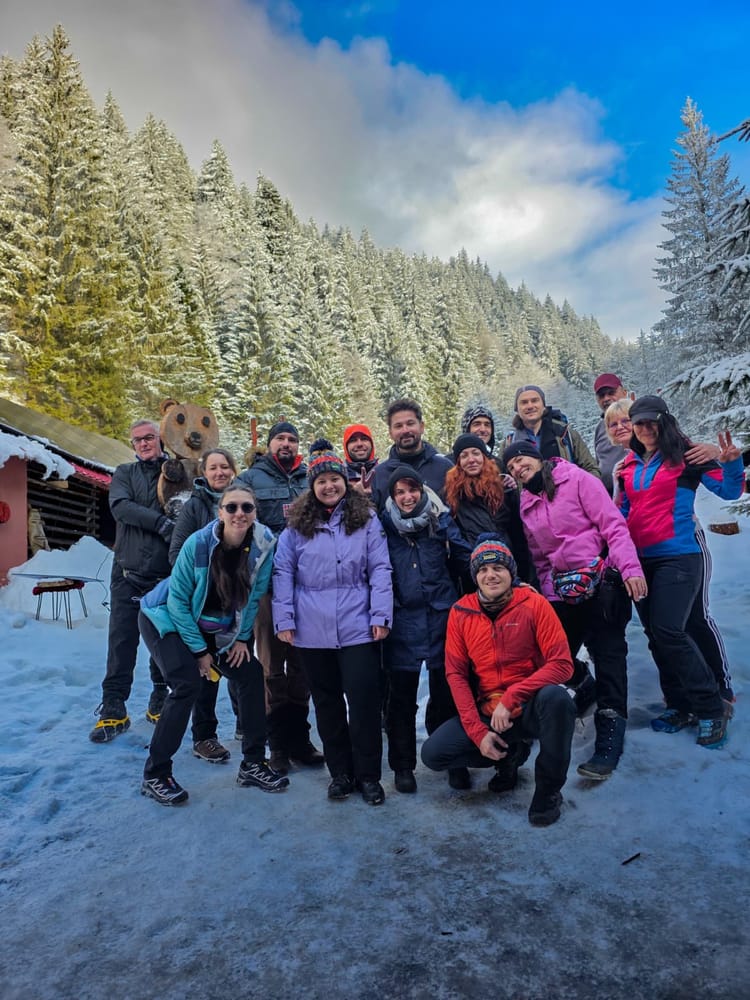
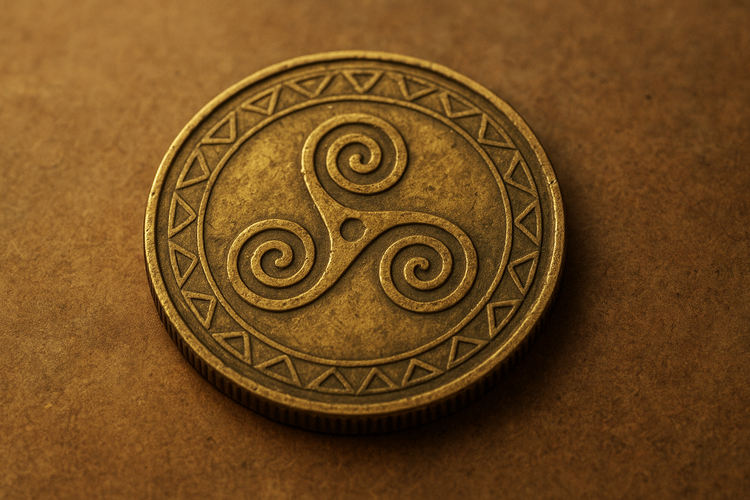
Member discussion